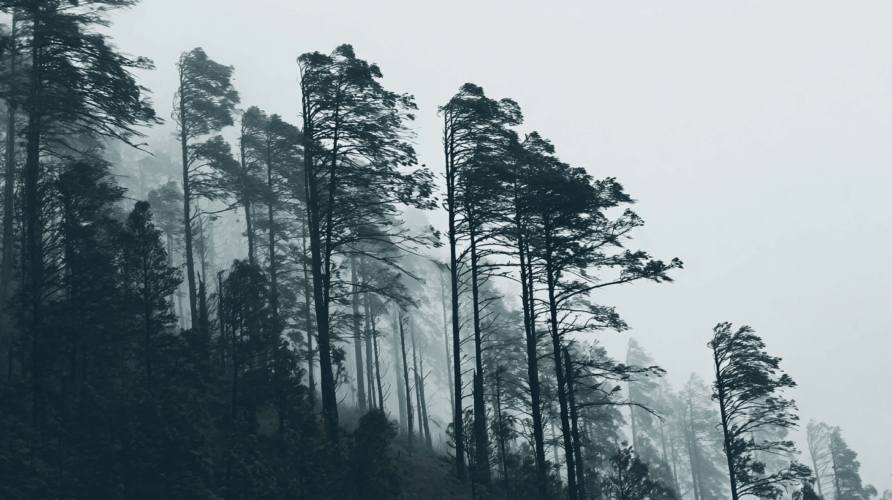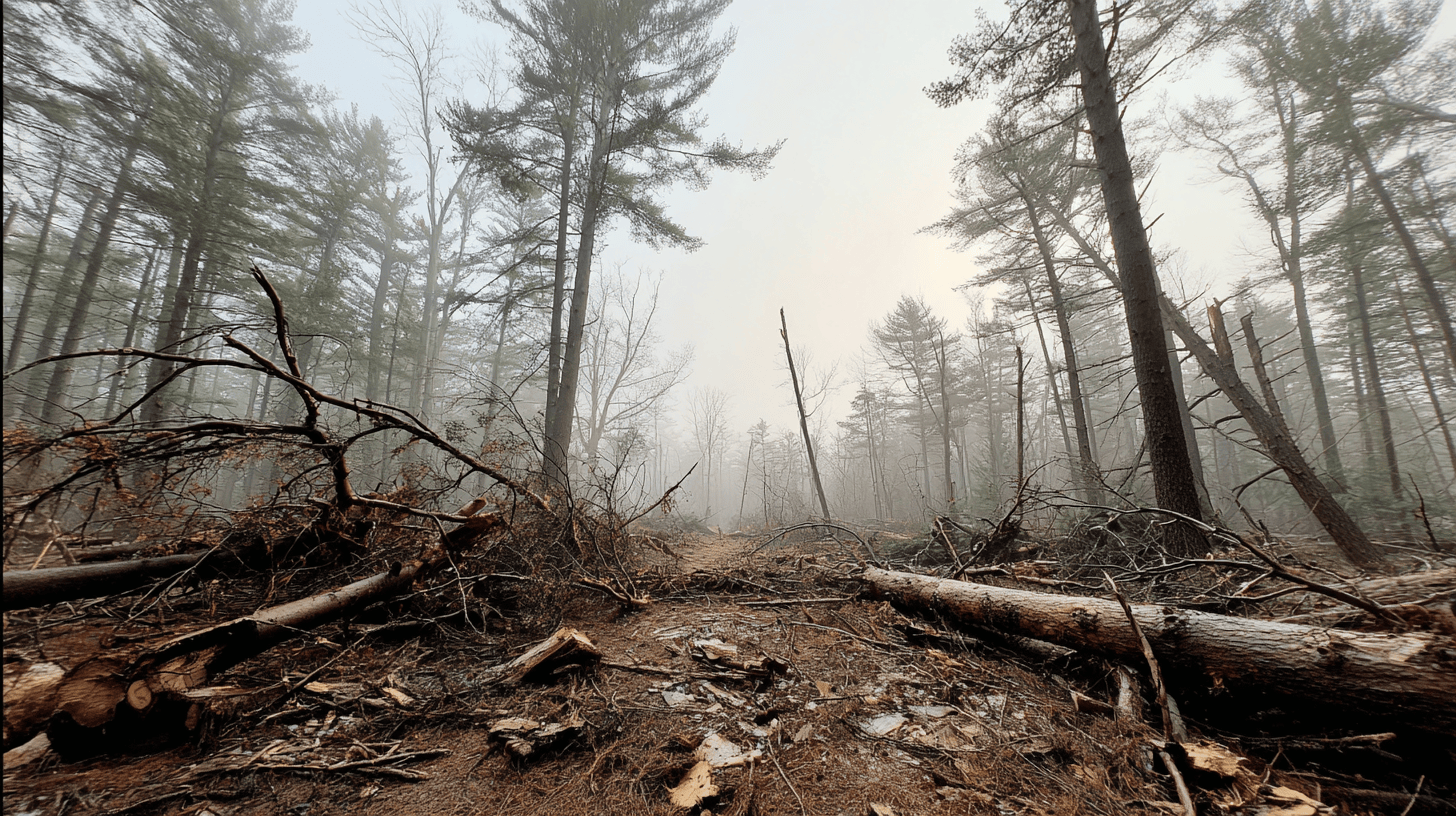Disclosure: This content may contain affiliate links. Read my disclosure policy.
Thinking about hiking in windy conditions? Wondering if it’ll be too windy to hike? Turns out there’s a scientific scale you can use…
I recently switched a hike from a very windy (but warmer) Friday to a much less windy (but much colder) Saturday.
I checked the forecast for the summit I was planning to hike on mountain-forecast.com and I saw that, on Friday, the winds up high would be 50 mph (80 kph) with temperatures around 45°F (7°C). With wind chill factored in, that would feel like 33°F (0.4°C). Just above freezing? Not too bad.
For Saturday, the wind was forecast to be 10 mph (16 kph) with temperatures around 20°F (-7°C). With wind chill factored in, that would feel like 9°F (-13°C). That’s pretty cold.
So my choice was: a warm-and-windy hike, or a calm-and-cold hike? I chose the cold hike. Here’s why I felt it was too windy to hike…
Is It Safe to Hike When It’s Windy?
When do the risks outweigh the rewards? At what point does “windy” become “too windy to hike”, and too dangerous? It turns out there‘s an actual scientific answer.
This post is about wind only. For planning a shoulder season or winter hike, you also need to factor in precipitation, visibility, ice and snow. Wind is only one factor.
Get access to hyper-detailed trail guides, insider tips, and expert advice. Join a vibrant community of like-minded hikers, receive exclusive content, and embark on unforgettable outdoor adventures. Whether you’re a seasoned outdoor enthusiast or just starting out on your hiking journey, this website provides invaluable resources to help you explore the best trails in the Catskills, Adirondacks, Hudson Highlands, Berkshires, and beyond. Get access now to all content on this website instantly and enjoy unique supporter benefits.
The forecast for both days was overcast skies with no rain or snow. The only major differences were the temperature and the wind. (Bear in mind: conditions can change rapidly on a mountain. You should always plan and pack for worse weather.)
It’s safe to hike when it’s windy — up to a point!
Warning! Any injury on a mountain is potentially life-threatening. In cold weather, once you stop moving, it only takes a few minutes for hypothermia to set in. Pretty quickly you’ll enter the zone of mental confusion and bad decision-making which sets you up to spiral into life-threatening danger.
How Windy is Too Windy to Hike?
I did think, briefly, about hiking in 50 mph winds. But then I did some Googling.
It turns out there are several well-established wind scales, with easy-to-grasp descriptions that give people a good feel for what they’re getting into. They’re all based to some degree on an older scale called the Beaufort wind force scale.
Let’s just say: you really don‘t want to hike in 50 mph winds.

The Beaufort Wind Force Scale
Francis Beaufort was, somewhat confusingly, the Irish son of a Protestant clergyman descended from French Protestant Huguenots. At some point, Beaufort’s parents moved from Ireland to London and, eventually, he went on to serve in the British Royal Navy.
One of Beaufort’s many accomplishments was standardizing the descriptions of wind speeds in plain English — so that one person’s stiff breeze was no longer another person’s gentle wind.
There are two sets of wind descriptions in Beaufort’s scale, one for sea and one for land. Below are the descriptions for winds on land…
The first 6 levels pose no problems for hikers…
- 0 / Calm / under 1 mph: smoke rises vertically
- 1 / Light Air / 1-3 mph: direction shown by smoke drift but not by wind vanes
- 2 / Light Breeze / 4-7 mph: wind felt on face; leaves rustle; wind vane moved by wind
- 3 / Gentle Breeze / 8-12 mph: leaves and small twigs in constant motion; light flags extended
- 4 / Moderate Breeze / 13-18 mph: raises dust and loose paper; small branches moved
- 5 / Fresh Breeze / 19-24 mph: small trees in leaf begin to sway; crested wavelets form on inland waters
Above level five, you will begin to notice resistance while walking…
- 6 / Strong Breeze / 25-31 mph: large branches in motion; whistling heard in telegraph wires; umbrellas used with difficulty
30 mph wind is where I start to nope-out. Read on to see what higher wind speed effect on walking looks like.
Above 30 mph, things escalate quickly…
- 7 / Moderate Gale / 32-38 mph: whole trees in motion; clear inconvenience felt when walking against the wind; will affect balance; avoid exposed ridge lines and cliffy edges; if the temperature is below freezing, you risk first degree frostbite on any exposed skin.
Above this level, staying upright is extremely difficult…
- 8 / Fresh Gale / 39-46 mph: twigs break off trees; wind force impedes progress; walking is arduous
Above this level, you’re in serious physical danger at even the lowest elevations…
- 9 / Strong Gale / 47-54 mph: slight structural damage (chimney pots and slates removed)
- 10 / Whole Gale / 55-63 mph: seldom experienced inland; trees uprooted; considerable structural damage
- 11 / Storm / 64-73 mph: very rarely experienced; accompanied by widespread damage
- 12 / Tornado or Hurricane / 74+ mph: devastation
It’s up to you to decide which level is your personal cut-off level.
When is it Too Windy to Hike?
Plenty of people love a windy walk. But how windy is too windy to hike? With this new information to hand, I decided it was best to postpone my own hike.
I like to stack the odds in my favor. Waiting 24 hrs for safer conditions is a no-brainer for me. Once the wind is forecast to get above 30 mph (50 kph) I reconsider my plans.
- Pack The 10 Essentials on every hike
- Remember that hiking safe is easy
Is it Too Windy to Hike in 40mph Winds?
Personally, I don’t think so. I get nervous any time the winds are forecast to be above 30 mph — and I start hearing twigs snap in the forest. No, thank you. Too windy to hike for me.
Get access to hyper-detailed trail guides, insider tips, and expert advice. Join a vibrant community of like-minded hikers, receive exclusive content, and embark on unforgettable outdoor adventures. Whether you’re a seasoned outdoor enthusiast or just starting out on your hiking journey, this website provides invaluable resources to help you explore the best trails in the Catskills, Adirondacks, Hudson Highlands, Berkshires, and beyond. Get access now to all content on this website instantly and enjoy unique supporter benefits.
Planning Ahead
Planning ahead is a crucial hiking skill, especially for mountain hikes where the risk of life-threatening injury is significant — and doubly so in cold conditions. (Read How Cold is Too Cold to Hike?)
The cold itself doesn’t worry me. I only start to get anxious when temperatures drop below 5°F (-15°C). At that point, I’m likely to rethink my plan and reschedule my hike for a warmer day.
Seeing a forecast for 50 mph winds gave me pause. But it also made me wonder if there might be…
Strategies for Hiking Safely in the Wind
First of all, always check the weather and consider it carefully: wind, precipitation, temp highs and lows, and wind chill.
Many hikers consult mountain-forecast.com. Here are some direct links to popular ranges…
The website uses a mathematical model to predict (i.e. guess) what the conditions will be at each summit. It’s a useful tool, but do not take its predictions as any kind of guarantee. Always plan and pack for worse weather.
If you plan to hike in high winds or windy conditions, make sure to bring trekking poles. They’re a great help in maintaining balance.
You should also get on top of your layering. Your body heat will fluctuate wildly, with exertion increasing your core temperature and the wind rapidly cooling your head, hands, limbs and torso.
If you find yourself caught in a sudden gale, remember that linking arms with fellow hikers can be a real anchor.
In trouble? Get down off the mountain as quickly and safely as you can. Stay away from steep drops. Consider your route and reconfigure plans as necessary.
Read More
Get full access…
Get instant access to the full version of this site and enjoy great supporter benefits: full galleries, full trail notes, early access to the latest content, and more.
Hot on the website right now…
Follow for more…
Follow my @TotalCatskills content on Instagram for regular hiking inspo and safe, inclusive community.


This was an excellent post
Appreciate it!
We had gusts of 75km/h (about 50mph) tonight and I cancelled a hike with youth – the conditions were unseasonably warm, but very icy and slippery and hiking through an open forest (i.e., canopy with little understory) made me nervous for their safety. I figured if we didn’t get an injury from a slip/fall, we would almost definitely have one from something falling on someone. I did wonder if I was being too conservative, but I don’t want to take chances when I’m responsible for other people’s safety.
Sounds wise to me. Good call.
Not even mentioned here, another danger is falling tree branches. A very large branch narrowly missed me while walking in 40-50 MPH winds. I won’t do that again.
Yep, today for example was too windy and the Catskills can be dangerous with a fresh breeze let alone a moderate gale like today. I’m sticking to the Gunks for now until the right weather day happens in the Catskills. Then it will be microspikes and snow shoes as long as the wind is less than 20mph.
Very useful article!
This year does seem a lot windier than the last few we’ve had.
Great article! I had gone on a hike last weekend and had to turn back around because the wind was so bad it was knocking me over! Definitely will take the wind into account way more in the future.
Yeah, once it gets above 30 mph, I take a second look at everything — and probably even lower wind speeds than that would make me rethink a winter hike.